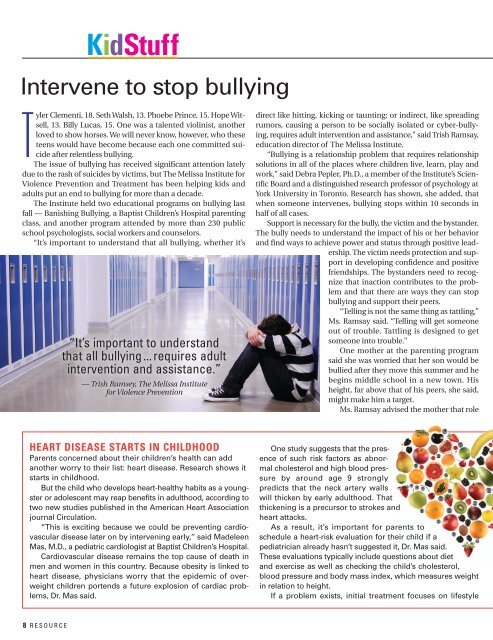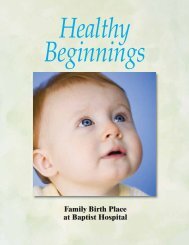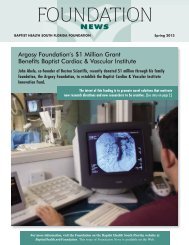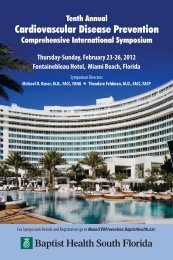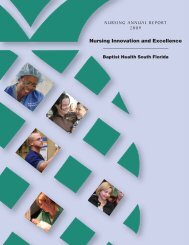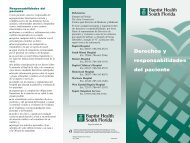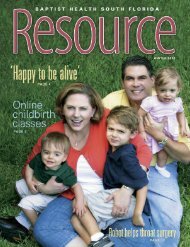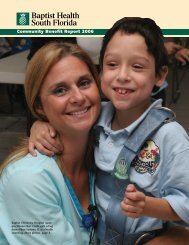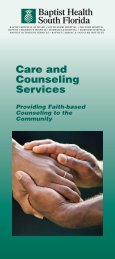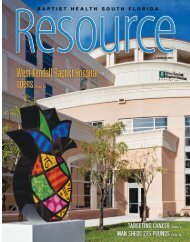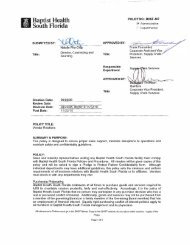SPRING 2011 - Baptist Health South Florida
SPRING 2011 - Baptist Health South Florida
SPRING 2011 - Baptist Health South Florida
You also want an ePaper? Increase the reach of your titles
YUMPU automatically turns print PDFs into web optimized ePapers that Google loves.
KidStuff<br />
Intervene to stop bullying<br />
Tyler Clementi, 18. Seth Walsh, 13. Phoebe Prince, 15. Hope Witsell,<br />
13. Billy Lucas, 15. One was a talented violinist, another<br />
loved to show horses. We will never know, however, who these<br />
teens would have become because each one committed suicide<br />
after relentless bullying.<br />
The issue of bullying has received significant attention lately<br />
due to the rash of suicides by victims, but The Melissa Institute for<br />
Violence Prevention and Treatment has been helping kids and<br />
adults put an end to bullying for more than a decade.<br />
The Institute held two educational programs on bullying last<br />
fall — Banishing Bullying, a <strong>Baptist</strong> Children’s Hospital parenting<br />
class, and another program attended by more than 230 public<br />
school psychologists, social workers and counselors.<br />
“It’s important to understand that all bullying, whether it’s<br />
“It’s important to understand<br />
that all bullying ... requires adult<br />
intervention and assistance.”<br />
— Trish Ramsey, The Melissa Institute<br />
for Violence Prevention<br />
direct like hitting, kicking or taunting; or indirect, like spreading<br />
rumors, causing a person to be socially isolated or cyber-bullying,<br />
requires adult intervention and assistance,” said Trish Ramsay,<br />
education director of The Melissa Institute.<br />
“Bullying is a relationship problem that requires relationship<br />
solutions in all of the places where children live, learn, play and<br />
work,” said Debra Pepler, Ph.D., a member of the Institute’s Scientific<br />
Board and a distinguished research professor of psychology at<br />
York University in Toronto. Research has shown, she added, that<br />
when someone intervenes, bullying stops within 10 seconds in<br />
half of all cases.<br />
Support is necessary for the bully, the victim and the bystander.<br />
The bully needs to understand the impact of his or her behavior<br />
and find ways to achieve power and status through positive leadership.<br />
The victim needs protection and support<br />
in developing confidence and positive<br />
friendships. The bystanders need to recognize<br />
that inaction contributes to the problem<br />
and that there are ways they can stop<br />
bullying and support their peers.<br />
“Telling is not the same thing as tattling,”<br />
Ms. Ramsay said. “Telling will get someone<br />
out of trouble. Tattling is designed to get<br />
someone into trouble.”<br />
One mother at the parenting program<br />
said she was worried that her son would be<br />
bullied after they move this summer and he<br />
begins middle school in a new town. His<br />
height, far above that of his peers, she said,<br />
might make him a target.<br />
Ms. Ramsay advised the mother that role<br />
HEART DISEASE STARTS IN CHILDHOOD<br />
Parents concerned about their children’s health can add<br />
another worry to their list: heart disease. Research shows it<br />
starts in childhood.<br />
But the child who develops heart-healthy habits as a youngster<br />
or adolescent may reap benefits in adulthood, according to<br />
two new studies published in the American Heart Association<br />
journal Circulation.<br />
“This is exciting because we could be preventing cardiovascular<br />
disease later on by intervening early,’’ said Madeleen<br />
Mas, M.D., a pediatric cardiologist at <strong>Baptist</strong> Children’s Hospital.<br />
Cardiovascular disease remains the top cause of death in<br />
men and women in this country. Because obesity is linked to<br />
heart disease, physicians worry that the epidemic of overweight<br />
children portends a future explosion of cardiac problems,<br />
Dr. Mas said.<br />
One study suggests that the presence<br />
of such risk factors as abnormal<br />
cholesterol and high blood pressure<br />
by around age 9 strongly<br />
predicts that the neck artery walls<br />
will thicken by early adulthood. That<br />
thickening is a precursor to strokes and<br />
heart attacks.<br />
As a result, it’s important for parents to<br />
schedule a heart-risk evaluation for their child if a<br />
pediatrician already hasn’t suggested it, Dr. Mas said.<br />
These evaluations typically include questions about diet<br />
and exercise as well as checking the child’s cholesterol,<br />
blood pressure and body mass index, which measures weight<br />
in relation to height.<br />
If a problem exists, initial treatment focuses on lifestyle<br />
8 RESOURCE


